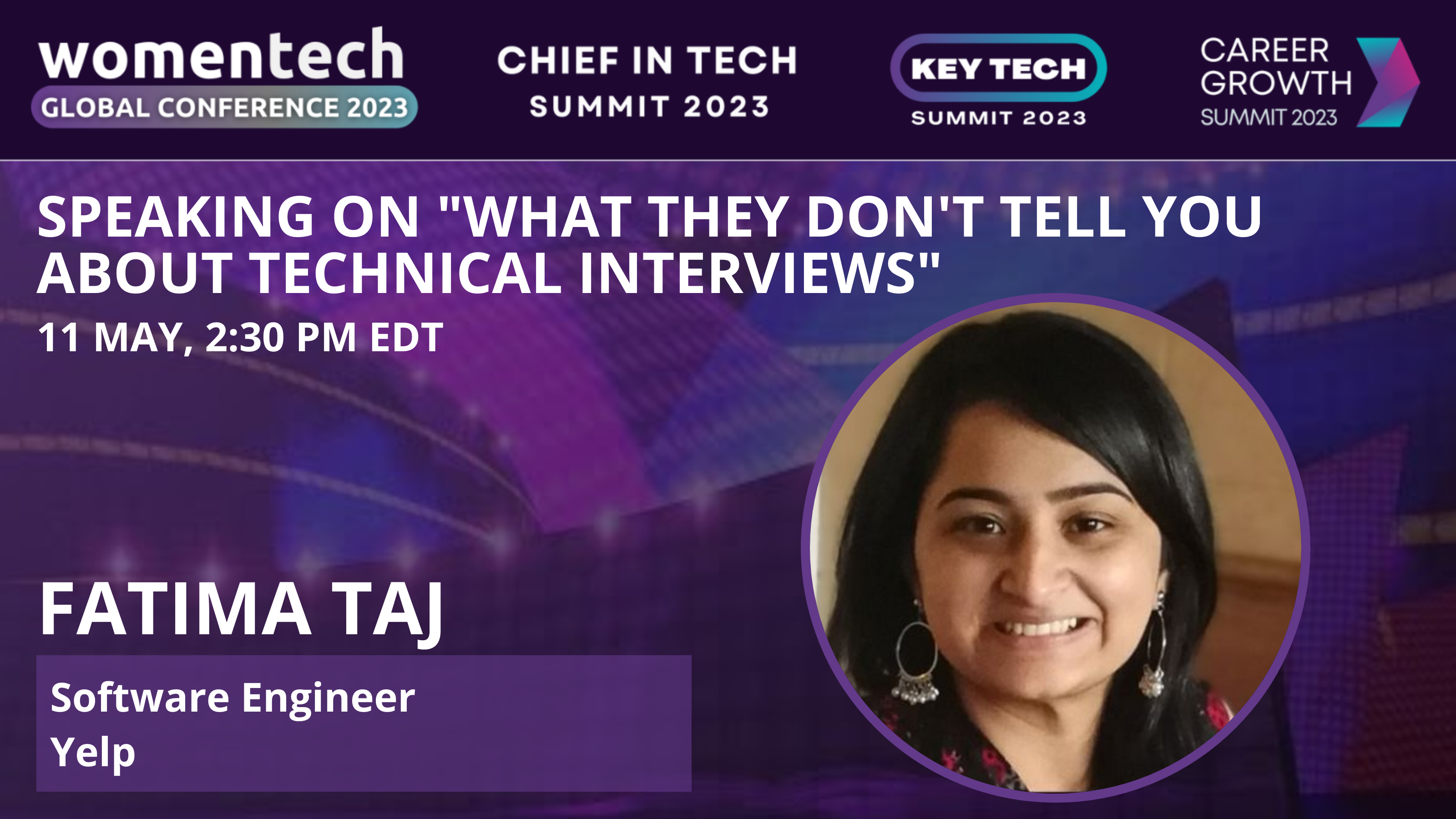Vote by Sharing
Unite 100 000 Women in Tech to Drive Change with Purpose and Impact.
Do you want to see this session? Help increase the sharing count and the session visibility. Sessions with +10 votes will be available to career ticket holders.
Please note that it might take some time until your share & vote is reflected.
Session: What they don't tell you about technical interviews
Having seen the technical interview process from both ends (as an interviewer and an interviewee), I'm interested in conducting a story-telling style presentation centered on preparing for software engineering interviews. More specifically, focusing on things we take for granted and the little things we could do to help us stand apart from other candidates.This will be a story-telling style presentation specifically meant for interns, new graduates, and career changers looking for opportunities within the tech industry. For each of the three major sections listed below, I plan on sharing 1-2 personal experiences, sample emails, and messages and concluding each category by sharing my recommendations on best approaching the challenges stated.
This talk's primary focus is to underline the things we take for granted and the little things we could do to help us stand apart from other candidates during technical interviews. I'm incredibly passionate about this topic because my most recent job hunt helped me realize how challenging this whole process can be, even more so because there are so many aspects to it that we should discuss more. The focus is always on perfecting your knowledge of data structures and algorithms and rarely on the little things that help you stand out as a candidate. After all, there can be multiple people who're going to solve a given problem, but only a couple who'll have offers extended to them. So what are these candidates doing differently? How is their approach to this process unique compared to all others? That is what I want to explore in this session.
Next, I'll move to the three broad categories detailed below and bullet points detailing what I plan to cover for each:
1. Pre-Interview
- The art of networking, specifically post-pandemic since COVID has changed the recruiting landscape significantly.
- Recommendations include the importance of your elevator pitch, templates on best reaching out to recruiters virtually, harnessing the power of referrals, and expanding your network through coffee chats.
- How many jobs should you apply to, and how (using platforms like Glassdoor and LinkedIn and the importance of staying consistent with applying to jobs instead of sporadically).
2. Interview
- In-depth explanation of how technical interviews are conducted, i.e., multiple rounds, broken down into behavioral, technical, and system design questions.
- A deep dive into the types of questions we can see in each round and how to best answer them.
- Recommendations on what the optimal strategy could look like, including the importance of communication, writing test cases, asking questions, and clarifying assumptions, among others.
3. Post Interview
- Post-interview etiquette, i.e., reaching out to your recruiter about the expected timeline, what to do in case of rejection or an offer, and an overview of what happens behind the scenes once you're finished with your interviews.
- The art of negotiation! This is something I'm incredibly passionate about and is so often swept under the rug! Strategies to best negotiate your offer and an explanation of compensation packages in the tech industry (equity, base salary, signing, and annual bonus).
Prerequisite knowledge: Just a healthy curiosity for how to succeed in technical interviews!
Learning outcomes:
1. Outline what the technical interview process looks like end to end, specifically for attendees new to the process.
2. Distinguish the factors that result in a 'hire' vs. 'no hire' decision, especially for attendees who feel frustrated with their lack of success in technical interviews despite seemingly doing everything correctly.
3. Exemplify the importance of negotiating your salary, especially as a woman in tech!
Key Takeaways
- Outline what the technical interview process looks like end to end, specifically for attendees new to the process.
- Distinguish the factors that result in a 'hire' vs. 'no hire' decision, especially for attendees who feel frustrated with their lack of success in technical interviews despite seemingly doing everything correctly.
- Exemplify the importance of negotiating your salary, especially as a woman in tech!
Bio
Fatima is a graduate of the University of Waterloo, Canada. Post graduation, she's worked full-time as a Software Developer at DRW, a trading firm, and currently works at Yelp as a Software Engineer. Fatima is passionate about supporting fellow tech enthusiasts and has spoken at over 70 hackathons across North America in 2022. In addition, she's also been a panelist at Harvard WeCode (2022 and 2023), presented at the Women Who Code Connect Event, Black is Tech Conference, Tapia Conference, Scale (Southern California Linux Expo), WITS MidAtlantic (Women in Tech Summit), and Women of Silicon Roundabout, London's biggest event for women in technology.


